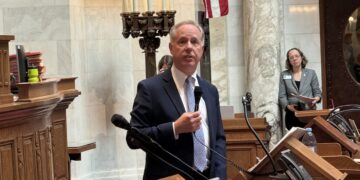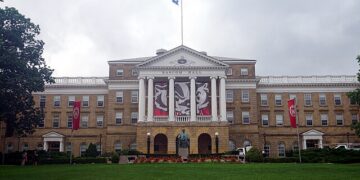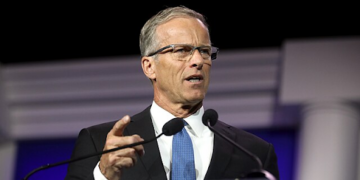The University of Wisconsin System is receiving a major funding increase under the 2025–27 state budget, following months of negotiation between Gov. Tony Evers and the Republican-controlled legislature. The compromise reflects divided-government dealmaking over shared priorities, including higher education, childcare, and special education.
The final agreement allocates more than $256 million in operational support for the UW System over the next two years. An additional $840 million is dedicated to capital building projects across the state’s campuses, bringing the total new investment to over $1.13 billion. It marks one of the largest higher education funding packages in recent Wisconsin history.
More than $100 million will go toward stabilizing campuses affected by recent program cuts, staff reductions, and closures. The goal is to preserve UW institutions as economic and workforce anchors across Wisconsin. Another $7 million will provide 24/7 virtual telehealth mental health services to students. $54 million is allocated for faculty and staff recruitment in high-demand fields, while $94 million will fund systemwide wage increases. UW–Green Bay’s Rising Phoenix Early College Program will receive $1 million to expand college credit access for high school students.
Tuition Increase Follows Budget Passage
Just one week after the budget was signed, the UW Board of Regents voted to increase tuition by 5% across most campuses. UW–River Falls will see a 5.8% hike, while UW–Green Bay will raise rates by 4%. This year marks the third straight tuition increase at the University of Wisconsin, and it’s drawing sharp criticism from top Republicans. This is despite the UW system receiving more than $1 billion in new state funding—including over $250 million for operations—tuition is once again going up.
State Senate President Mary Felzkowski blasted the move, accusing the universities of waiting until after securing the budget deal to hit students with a surprise hike. She also criticized UW–Madison’s recent messaging about dismantling its DEI department, calling it a distraction and claiming the positions were simply reassigned. Felzkowski argued the tuition hike, budget timing, and DEI messaging were all coordinated.
The Board cited inflation, rising operating costs, and competitive pay as reasons behind the decision. It was the third tuition increase since the 10-year freeze ended in 2023. Meanwhile, critics called UW–Madison’s concurrent media push announcing the dismantling of its DEI department a “stunt,” noting that many positions were simply reassigned to other departments. (RELATED: Big Beautiful Bill Ends Student Loan Program that Some Have Called Exploitative)
To improve transparency and reduce tuition pressure, the budget enacts several reforms. First, it guarantees that students can transfer general education credits between all UW campuses by fall 2026, allowing them to complete degrees faster while saving time and money. It also freezes the creation of new UW administrative positions, targeting bureaucratic bloat that contributes to rising college costs.
A major overhaul to the UW System’s outdated funding formula will shift more budget control to the legislature, prioritizing campuses that operate efficiently. And for the first time, UW faculty will be required to teach a minimum of 12 credits per semester—ensuring that professors earning six-figure salaries are directly teaching the courses families are paying for. (RELATED: Wisconsin Budget Passes with Bipartisan Support Despite Conservative Pushback)
Capital Investments Across the State
On the infrastructure side, the capital budget includes $194 million for Prairie Springs Science Center at UW–La Crosse, $189 million for health sciences upgrades at UW–Milwaukee, $160 million to restore Science Hall at UW–Madison, $98 million for the Sentry Hall expansion at UW–Stevens Point, $32 million for UW–Stout’s recreation complex, and $137 million to rebuild the Polk Learning Commons at UW–Oshkosh.
Other projects include residence hall and dining renovations, major deferred maintenance, and planning for the eventual replacement of UW–Madison’s Humanities Building. The budget also mandates that the UW System maintain current instructional staffing levels and faculty workload baselines from January 2024.
































